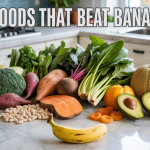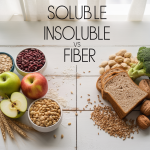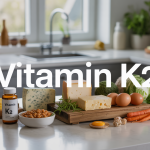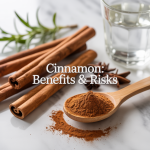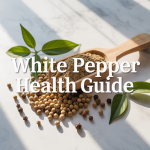Vitamin K plays a crucial role in blood clotting and bone health, yet many people don’t get enough of this essential nutrient. This guide is for anyone wanting to understand how vitamin K affects their body and how to maintain healthy levels through diet and lifestyle choices.
We’ll explore the key signs that might signal you’re not getting enough vitamin K and what health risks come with a deficiency. You’ll also discover which everyday foods pack the biggest vitamin K punch and learn how much you actually need based on your age and life stage.
Understanding Vitamin K’s Essential Role in Your Health
Two main forms of vitamin K and their unique benefits
Vitamin K comes in two primary forms that work differently in your body. Vitamin K1 (phylloquinone) dominates leafy green vegetables like spinach, kale, and broccoli. Your body mainly uses K1 for blood clotting processes, making it the go-to nutrient when you get a cut or injury.
Vitamin K2 (menaquinone) appears in fermented foods, animal products, and is produced by bacteria in your gut. This form specializes in directing calcium to your bones and teeth while keeping it away from soft tissues like arteries. K2 has several subtypes, with MK-4 and MK-7 being the most researched and beneficial.
| Vitamin K Form | Primary Sources | Main Functions | Duration in Body |
|---|---|---|---|
| K1 (Phylloquinone) | Leafy greens, vegetables | Blood clotting | Hours |
| K2 (Menaquinone) | Fermented foods, animal products | Bone and heart health | Days to weeks |
The key difference lies in how long each form stays active in your system. K1 gets used up quickly for clotting, while K2 circulates longer and handles the calcium-management duties your body needs for long-term health.
How vitamin K supports blood clotting function
Your blood clotting system depends entirely on vitamin K to function properly. When you get injured, your body activates several proteins called clotting factors, and four of these proteins require vitamin K to work effectively.
The process starts when vitamin K activates proteins II, VII, IX, and X in your liver. These proteins then form a cascade reaction that transforms liquid blood into a solid clot at injury sites. Without enough vitamin K, this cascade breaks down, leading to excessive bleeding even from minor cuts.
Gamma-carboxylation represents the specific biochemical process by which vitamin K adds carbon dioxide groups to these clotting proteins. This modification changes the protein structure, allowing them to bind calcium ions effectively. The calcium binding enables these proteins to stick to cell surfaces where clotting needs to happen.
People taking blood-thinning medications like warfarin need to monitor their vitamin K intake carefully because these drugs work by blocking vitamin K’s clotting functions. Too much vitamin K can reduce the medication’s effectiveness, while too little can increase bleeding risks.
Bone health enhancement through vitamin K activation
Vitamin K transforms your bone health by activating osteocalcin, a protein that acts like a calcium magnet for your bones. Without sufficient vitamin K, osteocalcin remains inactive and cannot properly bind calcium into your bone matrix.
This process works alongside vitamin D and calcium to build stronger bones. While vitamin D helps you absorb calcium from food and calcium provides the building blocks, vitamin K ensures that calcium actually gets incorporated into bone tissue instead of floating around in your bloodstream.
Research shows that people with higher vitamin K2 intake have:
- 36% lower risk of hip fractures
- Increased bone mineral density in the spine and hips
- Reduced bone loss during aging
- Better calcium utilization throughout the skeletal system
Vitamin K also activates matrix Gla protein (MGP), which prevents calcium from depositing in soft tissues. This dual action means vitamin K both strengthens bones and protects against unwanted calcium buildup elsewhere in your body.
Cardiovascular protection mechanisms
Your heart and blood vessels benefit significantly from adequate vitamin K intake through several protective mechanisms. The same matrix Gla protein that prevents calcium deposits in soft tissues plays a crucial role in keeping your arteries flexible and healthy.
Arterial calcification represents one of the biggest threats to cardiovascular health as you age. When calcium builds up in artery walls, it creates stiff, narrow passages that force your heart to work harder. Vitamin K2 activates proteins that actively remove calcium from arterial walls and redirect it to bones, where it belongs.
Studies reveal that people with the highest vitamin K2 intake have:
- 52% lower risk of severe arterial calcification
- 41% reduced risk of coronary heart disease
- Lower blood pressure readings
- Improved arterial flexibility measurements
The cardiovascular benefits appear strongest with K2 rather than K1, particularly the MK-7 form found in fermented foods. This form stays active longer in your bloodstream, giving it more time to clean calcium deposits from your arteries.
Vitamin K also supports healthy blood vessel function by reducing inflammation and oxidative stress, two major contributors to heart disease development. The combination of calcium management and anti-inflammatory effects makes vitamin K a powerful ally for long-term cardiovascular health.
Recognizing Vitamin K Deficiency Signs and Risks
Easy bruising and excessive bleeding symptoms
When your body doesn’t have enough Vitamin K, the first signs often show up in how your blood clots. You might notice bruises appearing after minor bumps that wouldn’t normally leave marks. These bruises tend to be larger, darker, and stick around longer than usual.
Nosebleeds become more frequent and harder to stop. Small cuts that should clear up quickly keep bleeding for extended periods. Women may experience heavier menstrual periods or unusual bleeding between cycles. Even dental work or routine teeth cleaning can result in prolonged bleeding that concerns your dentist.
Blood in urine or stool, though less common, represents a serious sign of severe deficiency. Your gums might bleed easily when brushing or flossing, even with gentle pressure. These bleeding issues occur because Vitamin K plays a crucial role in producing proteins that help your blood clot properly.
Weakened bones and fracture susceptibility
Vitamin K deficiency doesn’t just affect your blood – it significantly impacts bone health too. Your bones may become more fragile and prone to fractures, even from minor falls or everyday activities that shouldn’t cause injury.
You might experience more frequent stress fractures, especially if you’re active in sports or exercise regularly. Older adults face particularly high risks, as age-related bone density loss combined with Vitamin K deficiency creates a dangerous combination.
The deficiency interferes with osteocalcin, a protein that helps bind calcium to your bones. Without adequate Vitamin K, your body can’t properly use the calcium you consume, regardless of how much you take in through food or supplements. This leads to weaker bone matrix and increased fracture risk over time.
Poor wound healing indicators
Cuts, scrapes, and surgical incisions take much longer to heal when you’re lacking Vitamin K. You might notice that minor wounds stay open and raw for weeks instead of the typical few days.
Surgical sites may show delayed healing, increased scarring, or complications that surprise your healthcare provider. Even paper cuts seem to linger and may reopen easily. The skin around wounds might appear pale or have poor color, indicating reduced blood flow and healing capacity.
Vitamin K deficiency also affects the formation of new blood vessels needed for proper wound repair. This means tissues don’t receive adequate oxygen and nutrients during the healing process, creating a cycle where recovery becomes increasingly difficult.
Top Natural Food Sources for Optimal Vitamin K Intake
Leafy Green Vegetables with the Highest Concentrations
Dark leafy greens pack the biggest Vitamin K punch you can find in nature. Kale leads the charge with an impressive 550 micrograms per cup, making it one of the most potent sources available. Just one serving easily covers your daily needs and then some.
Spinach comes in as a close second, delivering about 145 micrograms per cup of raw leaves. When cooked, spinach concentrates even more, providing roughly 890 micrograms per cup. Swiss chard, collard greens, and turnip greens all offer substantial amounts too, typically ranging from 300-400 micrograms per cooked cup.
Don’t overlook arugula and watercress – these peppery greens might seem delicate, but they’re loaded with Vitamin K. Fresh parsley deserves special mention here since just two tablespoons provide about 62 micrograms, making it an easy way to boost your intake daily.
| Leafy Green | Vitamin K (per cup) |
|---|---|
| Kale (raw) | 550 mcg |
| Spinach (cooked) | 890 mcg |
| Collard Greens | 400 mcg |
| Swiss Chard | 300 mcg |
| Turnip Greens | 380 mcg |
Fermented Foods Rich in Vitamin K2
Fermented foods bring you Vitamin K2, which your body uses differently than the K1 found in plants. Natto, a traditional Japanese fermented soybean dish, stands as the absolute champion here. One serving contains roughly 850 micrograms of K2 – that’s massive compared to other sources.
Aged cheeses offer another delicious way to get K2. Hard cheeses like Gouda, aged cheddar, and Parmesan contain meaningful amounts, typically 20-30 micrograms per ounce. The longer the aging process, the higher the K2 content tends to be.
Sauerkraut and other fermented vegetables provide modest but valuable amounts of K2. While not as concentrated as natto or aged cheese, they’re more accessible options for most people. Kefir and yogurt also contribute some K2, especially when made from grass-fed dairy.
Animal Products Containing Bioactive Forms
Grass-fed animal products naturally contain higher levels of Vitamin K than their grain-fed counterparts. Beef liver tops the list among organ meats, providing about 100 micrograms per 3-ounce serving. Chicken liver offers similar benefits and might be more palatable for some people.
Egg yolks from pasture-raised chickens contain meaningful amounts of K2, especially when the hens eat their natural diet of bugs and grass. The darker the yolk, the more nutrients it typically contains.
Fatty fish like salmon, sardines, and mackerel provide modest amounts of Vitamin K along with their well-known omega-3 benefits. While not the richest sources, they contribute to your overall intake when eaten regularly.
Ground beef from grass-fed cattle contains more K2 than conventional beef. The same goes for dairy products – grass-fed butter and milk naturally provide more Vitamin K than conventional versions.
Herbs and Spices That Boost Vitamin K Levels
Fresh herbs pack surprising amounts of Vitamin K into tiny packages. Basil leads among culinary herbs, with just two tablespoons of fresh leaves providing about 55 micrograms. Fresh oregano, thyme, and sage all contribute meaningful amounts when used generously in cooking.
Dried herbs concentrate these nutrients even more. A teaspoon of dried basil contains roughly 18 micrograms, while dried parsley provides about 20 micrograms per teaspoon. These might seem like small amounts, but they add up when you cook with herbs regularly.
Chives, fresh cilantro, and dill all contribute to your daily Vitamin K intake. The key is using them frequently and in generous amounts rather than just as occasional garnishes.
Spices like paprika and cayenne pepper contain some Vitamin K, though in smaller quantities than fresh herbs. The real benefit comes from making herbs and spices a regular part of your cooking routine, where these small contributions accumulate over time.
Daily Vitamin K Requirements for Different Life Stages
Recommended intake for adults and seniors
Most healthy adults need around 90-120 micrograms of Vitamin K daily, with men requiring slightly more than women. Specifically, adult women should aim for 90 micrograms per day, while men need about 120 micrograms. These amounts support proper blood clotting and bone health maintenance.
As we age, our Vitamin K needs don’t dramatically change, but absorption can become less efficient. Seniors often benefit from paying closer attention to their intake, especially if they’re taking medications that interfere with Vitamin K metabolism. Older adults on blood thinners like warfarin need consistent daily intake rather than varying amounts, as fluctuations can affect medication effectiveness.
Special needs during pregnancy and breastfeeding
Pregnant women require the same 90 micrograms daily as other adult women, but maintaining adequate levels becomes extra important for both mother and baby. Vitamin K plays a critical role in preventing bleeding complications during delivery and supports proper fetal bone development.
Breastfeeding mothers also need 90 micrograms daily, though their bodies prioritize the baby’s needs. Since breast milk contains relatively low levels of Vitamin K compared to formula, exclusively breastfed infants typically receive a Vitamin K injection at birth to prevent bleeding disorders.
Children’s vitamin K requirements for proper development
Children’s Vitamin K needs vary significantly by age:
| Age Group | Daily Requirement |
|---|---|
| 0-6 months | 2.0 mcg |
| 7-12 months | 2.5 mcg |
| 1-3 years | 30 mcg |
| 4-8 years | 55 mcg |
| 9-13 years | 60 mcg |
| 14-18 years | 75 mcg |
Newborns have particularly low Vitamin K stores and limited gut bacteria to produce it naturally. This is why most hospitals administer Vitamin K shots to prevent vitamin K deficiency bleeding, a serious condition that can occur in the first few months of life.
School-age children usually get adequate amounts through a balanced diet, but picky eaters might fall short. Growing teens need increased amounts to support rapid bone development and increased muscle mass.
Factors that increase your vitamin K needs
Several conditions and lifestyle factors can bump up your Vitamin K requirements. People with fat malabsorption disorders like Celiac disease, Crohn’s disease, or cystic fibrosis often need higher intakes since Vitamin K is fat-soluble and requires proper fat digestion for absorption.
Long-term antibiotic use can wipe out beneficial gut bacteria that naturally produce Vitamin K, creating a temporary deficiency. Heavy alcohol consumption interferes with Vitamin K metabolism and storage in the liver.
Certain medications beyond blood thinners affect Vitamin K status. Cholesterol-lowering drugs, some seizure medications, and broad-spectrum antibiotics can all reduce available Vitamin K levels. People taking these medications should discuss their needs with healthcare providers.
Athletes and highly active individuals might benefit from slightly higher intakes to support bone remodeling from intense training. Similarly, people recovering from fractures or bone surgery often need optimized Vitamin K levels to support healing processes.
Individuals following very restrictive diets or those with limited access to fresh vegetables may struggle to meet basic requirements and could benefit from monitoring their intake more carefully.
Maximizing Vitamin K Absorption and Effectiveness
Combining vitamin K with healthy fats for better uptake
Your body absorbs Vitamin K much more effectively when you pair it with dietary fats. Since Vitamin K is a fat-soluble vitamin, eating it alongside healthy fats can boost absorption rates by up to 400%. Think of fat as the delivery vehicle that helps your intestines grab onto this essential nutrient.
Simple ways to maximize this combination include drizzling olive oil over your spinach salad, adding avocado to your kale smoothie, or cooking your leafy greens in coconut oil. Nuts and seeds work great too – toss some almonds into your collard greens or sprinkle hemp seeds on your broccoli.
Even a small amount of fat makes a big difference. Just one tablespoon of healthy oil or a handful of nuts can dramatically improve how much Vitamin K your body actually uses from your meal.
Timing your vitamin K intake for optimal results
Spreading your Vitamin K intake throughout the day is more effective than consuming large amounts all at once. Your body can only absorb a certain amount at one time, so consuming Vitamin K-rich foods throughout multiple meals helps maintain steady blood levels.
Morning tends to be ideal for your largest dose, especially if you’re taking supplements. Your digestive system is fresh and ready to process nutrients efficiently after an overnight fast. Having a green smoothie or spinach omelet for breakfast sets you up well for the day.
If you’re on blood-thinning medications like warfarin, consistency becomes even more important. Keep your daily Vitamin K intake relatively stable rather than having huge variations from day to day. This helps your medication work predictably.
Supplements versus natural food sources comparison
| Factor | Natural Food Sources | Supplements |
|---|---|---|
| Absorption Rate | Higher with dietary fats | Variable, depends on formulation |
| Additional Nutrients | Comes with fiber, antioxidants, minerals | Isolated nutrient only |
| Cost | Generally lower | Can be expensive |
| Convenience | Requires meal planning | Quick and easy |
| Overdose Risk | Very low | Possible with high doses |
Food sources win for most people because they provide Vitamin K alongside other beneficial compounds. Leafy greens give you folate, fiber, and antioxidants as a bonus package. Your body recognizes these whole food nutrients more easily than isolated compounds.
Supplements make sense if you have absorption issues, limited access to fresh produce, or specific medical conditions. Choose supplements that include some fat in the formulation (like soft gels with oil) or take them with a meal containing healthy fats. Quality matters here – look for third-party tested products that specify the exact form of Vitamin K they contain.
Vitamin K plays a crucial role in keeping your blood clotting properly and your bones strong, yet many people don’t get enough of it without realizing it. From leafy greens like spinach and kale to fermented foods and certain oils, getting your daily dose is easier than you might think. The key is understanding how much you need at different stages of life and pairing vitamin K-rich foods with healthy fats to help your body absorb them better.
Don’t wait for warning signs like easy bruising or weak bones to show up. Start adding more vitamin K foods to your meals today – your future self will thank you. Small changes like tossing extra spinach in your smoothie or snacking on broccoli can make a real difference in your overall health and well-being.
